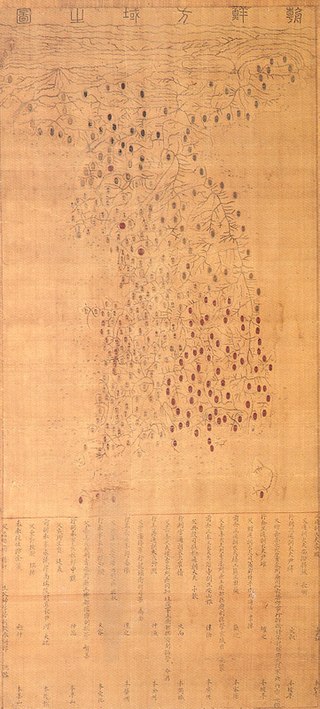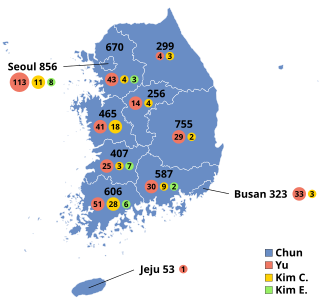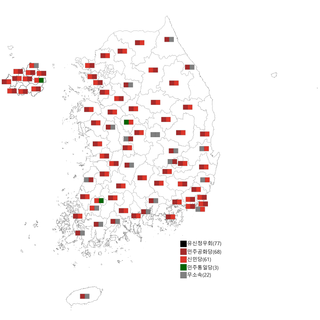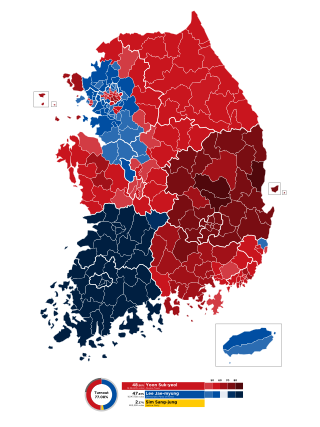
The history of South Korea formally begins with the Japanese surrender on 2 September 1945. Noting that, South Korea and North Korea are entirely different countries, despite still being the same people and on the same peninsula.

The president of the Republic of Korea, also known as the president of South Korea (Korean: 대통령), is the head of state and head of government of the Republic of Korea. The president leads the State Council, and is the chief of the executive branch of the national government as well as the commander-in-chief of the Republic of Korea Armed Forces.

Park Geun-hye is a South Korean politician who served as the 11th president of South Korea from 2013 to 2017, when she was impeached and convicted on related corruption charges.

The fourth Republic of Korea was the government of South Korea from November 1972 to March 1981.

The fifth Republic of South Korea was the government of South Korea from March 1981 to December 1987.

Presidential elections were held in South Korea on 16 December 1987. They marked the establishment of the Sixth Republic, as well as the end of the authoritarian rule that had prevailed in the country for all but one year since its founding in 1948. They were the first direct presidential elections since 1971. For the previous 15 years, presidents had been indirectly elected by the National Conference for Unification, an electoral college dominated by the governing party.

The June Democratic Struggle, also known as the June Democracy Movement and June Democratic Uprising, was a nationwide pro-democracy movement in South Korea that generated mass protests from June 10 to 29, 1987. The demonstrations forced the ruling government to hold elections and institute other democratic reforms, which led to the establishment of the Sixth Republic, the present-day government of South Korea.

Two-stage presidential elections were held in South Korea in February 1981. An electoral college was elected on 11 February, which in turn elected the president on 25 February. They were the last indirect presidential elections controlled by the government of Chun Doo-hwan under the new 1980 constitution. Chun was re-elected with 90% of the electoral college vote.

Indirect presidential elections were held in South Korea on 27 August 1980 to fill the vacancy caused by President Choi Kyu-hah's resignation.

Legislative elections were held in South Korea on 27 February 1973 to elect 146 members of the National Assembly. Another 73 members appointed by President Park Chung-hee were indirectly elected by the National Conference for Unification on 7 March 1973.

Legislative elections were held in South Korea on 12 December 1978 to elect 154 members of the National Assembly. Another 77 members appointed by President Park Chung-hee were indirectly elected by the National Conference for Unification on 21 December 1978.

Presidential elections were held in South Korea in December 1972 following the promulgation of the Yushin Constitution, which created the National Conference for Unification, a body whose functions included being an electoral college for presidential elections. Incumbent President Park Chung-hee claimed that Western-style liberal democracy would bring more chaos to the economically struggling nation than it could afford. In contrast, he argued that the Yushin system created a "Korean-style democracy" with a strong, unchallenged presidency. He argued this system was necessary to keep the country stable.

Presidential elections were held in South Korea on 6 July 1978, the second elections held under the Restoration Constitution, which gave the members of the National Conference for Unification the power to elect the president.
Presidential and vice- presidential elections were held in South Korea on 20 July 1948, following the Constitutional Assembly elections in May. The president was to be elected by the members of the National Assembly, as instructed by the 1948 Constitution. Of the 198 members of the National Assembly, 196 were present for the vote. A candidate required two-thirds of the votes cast to win. Syngman Rhee was elected with 180 votes, and took over the government to oversee the transfer of power from the United States Army Military Government in Korea.

The impeachment of Park Geun-hye, President of South Korea, was the culmination of a political scandal involving interventions to the presidency from her aide, Choi Soon-sil. The impeachment vote took place on 9 December 2016, with 234 members of the 300-member National Assembly voting in favour of the impeachment and temporary suspension of Park Geun-hye's presidential powers and duties. This exceeded the required two-thirds threshold in the National Assembly and, although the vote was by secret ballot, the results indicated that more than half of the 128 lawmakers in Park's party Saenuri had supported her impeachment. Thus, Hwang Kyo-ahn, then Prime Minister of South Korea, became Acting President while the Constitutional Court of Korea was due to determine whether to accept the impeachment. The court upheld the impeachment in a unanimous 8–0 decision on 10 March 2017, removing Park from office. The regularly scheduled presidential election was advanced to 9 May 2017, and Moon Jae-in, former leader of the Democratic Party, was elected as Park's permanent successor.

Paek Nam-un was an economist, educator and politician during the Japanese colonial period and following the establishment of the Democratic People's Republic of Korea. He was a professor of economics at Yeonhee College and an economic theorist of the Communist Party of Korea, and a representative figure of socialist economists during the Japanese colonial period along with Lee Soon-Tak. After the independence, on the premise of some asset class and solidarity, in the article 'The Path of the Chosun People's', 'Combination of New Democracy ' was proposed. After liberation, Kim Doo-bong, Heo Jeong-suk, and Choi Chang-ik connected with Nam Joseon New Democratic Party and Nationalist Democratic Front, but did not come down after coming to North Korea with Kim Gu, Kim Kyu-sik, Jang Geon-sang in April 1948. Since then, he served as the first literary statue of the Democratic People's Republic of Korea and the chairman of the Supreme People's Assembly.

Presidential elections were held in South Korea on 9 March 2022. Under the South Korean constitution, presidents are restricted to a single five-year term, meaning that incumbent president Moon Jae-in was ineligible to run for a second term. Opposition candidate Yoon Suk-yeol of the People Power Party won the election, defeating candidate Lee Jae-myung of the incumbent Democratic Party.
The 2021 South Korean by-elections were held in South Korea on 7 April 2021. The National Election Commission announced on 2 March 2021, that the by-elections would be held for 21 public offices or electoral districts, including 2 Metropolitan mayors, 2 Municipal mayors, 8 Metropolitan Council constituencies, and 9 Municipal Council constituencies. Candidate registration ran from 18 to 19 March, and the list of candidates was confirmed on 26 March.
An indirect legislative election was held in South Korea on 16 February 1976 to elect 73 members of the National Assembly who have been appointed by President Park Chung-hee.

The National Conference for Unification was an organization of indirect democracy established in accordance with the Constitution when the 4th Republic was launched with the Yushin Constitution on October 17, 1972. The most important function was to promote independent peaceful reunification policies, which were the core of the Yushin Constitution, and indirect presidential elections during the 4th Republic From August 1973, the NCU was decided as National Assembly. The National Assembly was composed of delegates directly elected by the people from each district across the country, and the delegates of the National Assembly for Unification were unofficially called Tongdae.

















